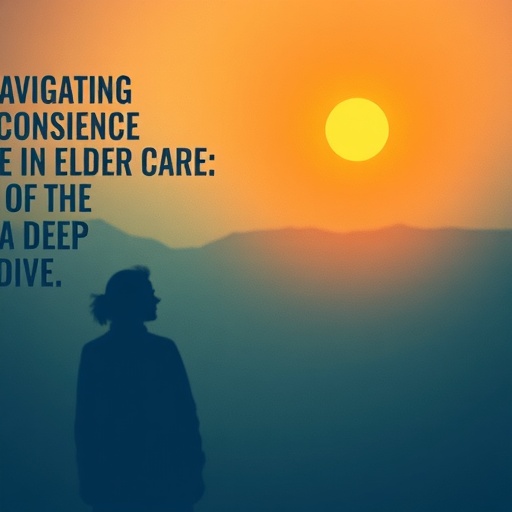In the intricate arena of healthcare, the management of conscience, particularly in the context of elder care, emerges as a crucial yet often overlooked topic. Recently, a groundbreaking study conducted by Mazaheri, Nazari, and Norberg digs deep into the psychological and ethical dimensions that shape how caregivers address their own conscience while providing care to older individuals. This research is pivotal, shedding light on the complexities faced by professionals who must navigate their moral responsibilities alongside the often challenging realities of caregiving.
The study employs a phenomenological hermeneutical approach, aiming to uncover the nuanced experiences of caregivers who grapple with feelings of guilt, anxiety, and ethical dilemmas. It highlights how external pressures, such as organizational demands and societal expectations, can intensify these internal conflicts. The findings reveal that the path to a clear conscience is rarely straightforward; instead, it is riddled with obstacles that require caregivers to engage in deep self-reflection and moral deliberation.
Throughout the research, interviews with caregivers serve as the backbone of the qualitative analysis. These in-depth conversations unveil the raw emotional toll that caring for older adults can have on one’s conscience. Caregivers share their personal stories, illustrating moments where their values clashed with the realities of patient care. Such conflicts can be triggered by various factors, including inadequate resources, time constraints, and conflicting professional obligations, leading to a profound sense of distress.
In their quest for ethical clarity, caregivers often seek solace in peer support and professional guidance. The study emphasizes the importance of building a community among caregivers, where shared experiences can facilitate a healthier coping mechanism for dealing with troubled consciences. Emotional support networks can provide essential reassurance and validation, allowing caregivers to reflect not only on their challenges but also on their successes and the positive impact they have on the lives of older adults.
Moreover, the authors suggest that institutions must prioritize conscience-supportive environments. This encompasses providing training and resources to help caregivers navigate the emotional and ethical challenges they face. By fostering a culture that encourages open dialogue about conscience and ethical concerns, healthcare organizations can empower their staff to manage stressors that may cloud their moral judgment.
The study also advocates for a reevaluation of how success is measured in caregiving contexts. Often, metrics focus on efficiency and productivity, sidelining the more profound, qualitative aspects of care that directly impact caregivers’ consciences. By redefining success to include moral and ethical wellbeing, healthcare systems may mitigate some of the internal conflicts that caregivers face, promoting a more sustainable practice.
Regrettably, the emotional burdens experienced by caregivers, stemming from concerns about providing adequate care and making ethical decisions, can lead to burnout and even attrition. Recognizing these emotional tolls is crucial, as it not only affects the caregivers themselves but ultimately impacts the quality of care that older adults receive. It becomes clear that unresolved conscience issues can lead to a cycle of distress that diminishes both caregiver satisfaction and patient outcomes.
In addressing these issues, the study underscores the need for ongoing education and training focused on ethical decision-making and emotional resilience. Caregivers must be equipped with tools to manage their experiences and cultivate a clearer conscience in their professional journeys. By investing in their emotional and ethical development, organizations can forge stronger, more resilient teams dedicated to providing compassionate and competent care.
The implications of this research extend beyond individual caregivers to the larger healthcare system. Policymakers and healthcare leaders need to consider how organizational structures can be designed to support moral clarity and emotional health. Initiatives that promote ethical discussions within teams and embed conscience support in clinical guidelines can pave the way for a culture of care that prioritizes both patient and caregiver well-being.
It is important to remember that caregivers are not merely providers of services; they are individuals who invest their emotions and identities into their work. Preserving the sanctity of their conscience is paramount for sustaining the spirit of caregiving. The findings from this study will inform a broader discourse on the ethical dimensions of elder care, encouraging stakeholders at all levels to prioritize the mental and moral health of caregivers.
As society increasingly recognizes the significance of ethical aging, the findings of this research provide critical insights into how individuals can cope with the complexities of conscience in elder care settings. The journey towards achieving a clear conscience in caregiving is an intricate one, and this study opens up avenues for meaningful dialogue and systemic change. As we strive to improve care for older adults, we must also commit to nurturing the caregivers who dedicate their lives to this noble profession.
The path ahead is challenging, yet the potential for transformation is vast. By fostering a culture of understanding and support, we can ensure that caregivers do not have to navigate their troubled consciences alone. Together, we can cultivate environments where ethical care thrives and where the mental and emotional welfare of all caregivers is valued as much as the care they provide.
In conclusion, the phenomenological hermeneutical study conducted by Mazaheri, Nazari, and Norberg offers an enlightening exploration of the moral complexities in elder care. By examining the troubled conscience of caregivers, the authors contribute to a vital conversation on ethics in healthcare, emphasizing the need for supportive systems and increased awareness. As we continue to address the nuances of caregiving, we must remain mindful of the ethical landscapes that shape our professionals’ experiences.
Subject of Research: The convergence of ethics and emotional well-being in elder care.
Article Title: Path to Clear Conscience and How to Deal with Troubled Conscience in Older People Care: A Phenomenological Hermeneutical Study.
Article References:
Mazaheri, M., Nazari, S. & Norberg, A. Path to clear conscience and how to deal with troubled conscience in older people care: a phenomenological hermeneutical study.
BMC Nurs 24, 1171 (2025). https://doi.org/10.1186/s12912-025-03829-9
Image Credits: AI Generated
DOI:
Keywords: Elder care, moral ethics, conscience, caregiver support, phenomenological study.




